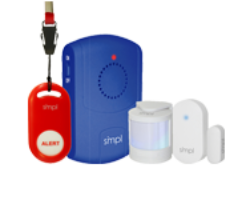Uncategorized

Pets & Alzheimer’s Sufferers
Alzheimer’s patients who are exposed to pets such as dogs display more positive behavior, according to a study carried out on an Alzheimer’s special care unit. Additional studies show that pets can provide companionship, reduce isolation, and ease anxiety. Modern
technology has now embraced the benefits that pets offer Alzheimer’s patients. These studies have resulted in therapy pets increasingly utilized by individuals with cognitive disorders.
But exactly how do real and replica pets help Alzheimer’s patients? Dr. Jonathan Graff-Radford states that regular physical activity can slow down dementia symptoms in those who already have the disease, and can delay the onset of Alzheimer’s in those who are at risk of developing it. Despite this, 28% of over 50’s never exercise, according to the Centers for Disease Control & Prevention (CDC). This is concerning as this group is one of the most at risk of dementia. Thankfully, when a pet is brought into the mix, individuals with Alzheimer’s and those who are at risk of developing it are more likely to:
- Head outdoors
- Enjoy long walks with their companion
- Get up and play with their pet
- Explore new locations on foot
Combat loneliness
38% of people living with dementia say that they feel lonely, and a further 12% say that they’re not sure whether what they feel qualifies as loneliness, according to the Alzheimer’s Society.
Loneliness in Alzheimer’s patients typically occurs due to:
- A lack of confidence in their abilities
- Fear that they will become confused
- Losing contact with family and friends
- Being secretive about their health
As pets are always there, will always listen, and don’t judge, they make the perfect companion for individuals feeling these emotions. What’s more, having the responsibility of a pet provides people with a sense of purpose and makes them feel needed. Even if the pet is a lifelike replica rather than a real animal, these emotions are encouraged.
Increases feel-good hormones
Serotonin is a vital neurotransmitter that plays a significant role in a person’s mood, appetite, sleep, and alertness, in addition to multiple other things. Recent studies have found a link between low serotonin levels and the development of Alzheimer’s. As such, actions should be taken to boost the chemicals interacting with the brain in Alzheimer’s patients to prevent depressive symptoms and poor health taking over. Pet therapy is ideal for these individuals as the University of Missouri-Columbia found that stroking a dog for just a few minutes releases multiple “happiness hormones,” including serotonin.
Control & manage symptoms better
Naturally, not every individual with Alzheimer’s will want a pet. There are also factors to consider, such as meeting the pet’s exercise requirements and remembering to feed and groom it regularly. This is where pet therapy comes into its own as giving an individual with
Alzheimer’s a lifelike pet which breathes, sleeps, and feels like a real animal can alleviate a whole host of symptoms associated with Alzheimer’s disease. A 2016 study concluded that robotic pets can help control anxiety and depression symptoms just as well as medical drugs.
Additionally, pet therapy proved to be successful at symptom control in patients.
There’s no denying that Alzheimer’s can be a difficult disease to manage. But, thankfully, pets, including ones that utilize the latest technology, can provide a significant amount of love and affection that people with Alzheimer’s need. What’s more, these individuals will
benefit from having a companion by their side.
Brought to you by smpltec.com, Technology for Seniors News.

Is the Flu a Contributing Factor to Parkinson’s Disease?
An interesting bit of info from the New York Times about a possible link between influenza and Parkinson’s disease.
“For decades, neurologists have suspected there may be a link between the flu and Parkinson’s disease, a chronic and progressive disorder of the nervous system marked by problems with movement, cognitive changes and a range of other symptoms. Several earlier studies, for example, reported a sharp increase in Parkinson’s cases following the 1918 influenza pandemic. Some cases of Parkinson’s have been linked to environmental exposures to pesticides and other toxic chemicals, and genetics may also play a role, but most cases of Parkinson’s have no known cause.”
As with so many of these studies, we have to separate correlation from causation. That becomes exceptionally hard in a case like this because it’s almost impossible to find an adult who hasn’t had the flu at some point in their lives. Therefore finding a control group to compare the data to is incredibly difficult in a larger experimental study.
Brought to you by smpltec.com, Technology for Seniors News.

Patience – The Toughest Part of Caregiving
There was crying. Yelling. Tears & anger. Hurtful words were thrown about. This is caregiving.
On the surface, this isn’t what we typically associate with caregiving. Our minds go to gentle imagery. Soft, loving, maybe melancholy. But in our roles as adult caregivers of our senior loved ones, the frustrations and resentment can overwhelm the nurturing impulses at times. This stems from the sudden reversal of roles: the person who used to change diapers and dry tears is suddenly the one in need of basic care and protection. Emotional memories are among the last to be affected by memory issues; combine that with the thinning of the emotional “filter” with these conditions, and that inversion can be terribly traumatic for the care recipient. They resent being infantilized by a person who – on some level – they still picture as a child. Feelings of resentment spawn tough words, and the person who is upending their lives to care for a loved one starts to also feel resentment and anger. This can quickly turn into a feedback loop of harmful words and personal attacks if left unchecked.
This is where the magic word – patience – comes in. It is arguably the single most important skill for a senior caregiver to possess. Alzheimer’s, dementia, and other similar conditions are not rational, you cannot logic your way around them. They are inherently emotional and irrational, and you must be prepared for that. Your loved ones will not remember to do things if you just explain it to them the perfect way. They won’t suddenly recall how to care for themselves if you show them how important it is. Memory issues and other cognitive issues are not an attack on you and your caregiving; they’re horrible disease which attacks indiscriminately. Focus on immediate caregiving and preventing further harm, and ignore all else. Detach from your ego and let the emotional outbursts wash over you, because you know that’s the disease talking, not them. Always respond with kindness and gentleness, even when you want to scream and yell.
In caregiving, patience is the highest of virtues.
Brought to you by smpltec.com, Technology for Seniors News.

A Blood Test for Alzheimer’s?
From the NY Times, one of the more promising medical studies relating to Alzheimer’s in a long time.
A newly developed blood test for Alzheimer’s has diagnosed the disease as accurately as methods that are far more expensive or invasive, scientists reported on Tuesday, a significant step toward a longtime goal for patients, doctors and dementia researchers. The test has the potential to make diagnosis simpler, more affordable and widely available.
What does this mean? As with most diseases, early diagnosis can lead to early intervention. People whose blood tests come back positive for Alzheimer’s can begin moderate treatments & memory care activities at a stage where cognitive decline has not yet begun and those efforts are more effective. This isn’t a cure for the disease, but it may be welcome news for the millions of baby boomers who fear it’s effects.
Brought to you by smpltec.com, Technology for Seniors News.

Helping A Senior Loved One Overcome Chronic Joint Pain
Having arthritis or similar chronic conditions doesn’t mean you have to give up on living life. There are some simple tools you can employ to relieve the pain & discomfort associated with these conditions, without prescription drugs or unknown supplements.
At-home physical therapy – Creaky Joints has a great rundown of exercises for the hands you can do at home with no special equipment. These simple activities can help alleviate pain, improve flexibility, and potentially stave off any further degradation.
Learn which tools can help – As they say, the right tool for the right job. There are a plethora of tools available now which can help ease stress on arthritic joints. From jar & bottle cap openers in the kitchen to grab sticks in the yard to seat belt aides for the car. Even small devices can often yield significant results when used correctly and consistently. Almost any tool which lets you avoid bending, stretching, or making a fist can help alleviate arthritis pain.
Listen to your body – Anyone with arthritis knows that certain activities simply hurt more than others. Identify those painful activities and take steps to avoid them. If your hips hurt, get up and stretch every hour or so. Maybe use your elbow or shoulder to open a door rather than your hand and wrist. Try changing the lead leg you use when going up or downstairs. There are a plethora of small changes you can make to help keep your body healthy.
Ask for help – Maybe the hardest step to take, but the most important. Whether this means going to a rheumatologist, or asking your loved ones for help making your home “arthritis-friendly,” or just asking them to help you with regular tasks. Sometimes, a little help can go a long way.
Brought to you by smpltec.com, Technology for Seniors News.
London Drugs


smpl TECHNOLOGY FOR SENIORS & THE INFIRM
& THOSE WHO CARE FOR THEM
smpl’s mission is to develop products with both the caregiver and care recipient in mind. smpl products are designed to ease caregiver stress by enabling those you care for to live a more engaged, independent, and dignified life.
Where to Purchase:
Our retail partner, London Drugs, has 80 stores across western Canada, or you can visit their website www.londondrugs.com and shop for smpl and other products that you have come to trust from London Drugs.
smpl increases independence and safety. No Wi-Fi. No monthly fees. No hassle. Simple to use and surprisingly simple to set up.
FEATURED PRODUCTS
Alerts caregivers when immediate help is needed and your
close by to help
- The most simple, complete & expandable monitoring system.
- For anti-wandering, fall prevention & emergencies / help.
- Delivers safety, independence and peace of mind.
Eliminate the frustration of TV remotes
- One touch on/off of TV & Set-top box
- Favorite Channel button
- Works with all TV’s & Set-top Boxes
- Promotes independence.

- British Columbia
- Alberta
- Saskatchewan
- Manitoba
For a location nearest you,
click here for a larger searchable map.
TECHNOLOGY FOR CAREGIVERS
OTHER smpl PRODUCTS
Affiliate
Affiliate

smpl TECHNOLOGY FOR SENIORS & THE INFIRM
& THOSE WHO CARE FOR THEM
Lorem ipsum dolor sit amet, consectetur adipiscing elit, sed do eiusmod tempor incididunt ut labore et dolore magna aliqua. Ut enim ad minim veniam, quis nostrud exercitation ullamco laboris nisi ut aliquip ex ea commodo consequat. Duis aute irure dolor in reprehenderit in voluptate velit esse cillum dolore eu fugiat nulla pariatur.
abore et dolore magna aliqua. Ut enim ad minim veniam, quis nostrud exercitation ullamco laboris nisi ut aliquip ex ea commodo consequat. Duis aute irure dolor in reprehenderit in voluptate velit esse cillum dolore eu fugiat nulla pariatur.
FREE
shipping
ALL smpl PRODUCTS
- WANDER ALERT
- RADIO & MUSIC PLAYER
- REMINDER ROSIE
- TV REMOTE
- MUSIC PLAYER
- PHOTO PHONE
WellWise
smpl TECHNOLOGY FOR SENIORS & THE INFIRM
& THOSE WHO CARE FOR THEM
smpl’s mission is to develop products with both the caregiver and care recipient in mind. smpl products are designed to ease caregiver stress by enabling those you care for to live a more engaged, independent and dignified life. Wellwise, a new way to stay active and well, was created to help Canadians take charge of the way they age.
Where to Purchase:
Our retail partner, wellwise, has over 43 stores across Canada, or you can visit their website www.wellwise.ca and shop for smpl and other products that you have come to trust from Shoppers Home Health Care.
smpl Increases independence and safety. No Wi-Fi. No monthly fees. No hassle. Simple to use- and surprisingly simple to set up.
FEATURED PRODUCTS

Alerts caregivers when immediate help is needed and your
close by to help
- The most simple, complete & expandable monitoring system.
- For anti-wandering, fall prevention & emergencies / help.
- Delivers safety, independence and peace of mind.

Eliminate the frustration of TV remotes
- One touch on/off of TV & Set-top box
- Favorite Channel button
- Works with all TV’s & Set-top Boxes
- Promotes independence.
- Ontario
- Quebec
- Alberta
- British Columbia
For a location nearest you,
click here for a larger searchable map.
TECHNOLOGY FOR CAREGIVERS
OTHER smpl PRODUCTS

Technological Aides for Seniors
Growing old shouldn’t have to mean falling behind. And that includes technologically.
Here are just a few items that can help your senior loved one to use and enjoy the technological bounty around us.
Vertical Mice – 90 degrees can make a world of difference. Vertical mice function just like normal mice but are ergonomically designed to alleviate stresses on the hand, wrist, and forearm. They’re often used by sufferers of carpal tunnel syndrome or chronic wrist tendonitis, but they can be extremely beneficial for arthritis sufferers, too.





































